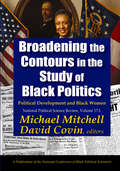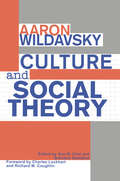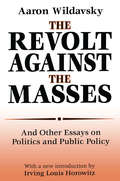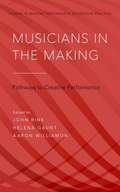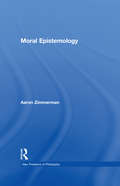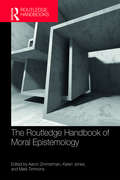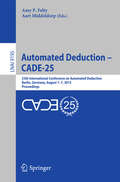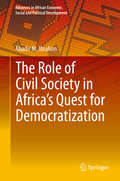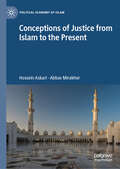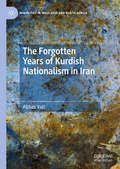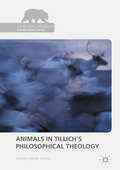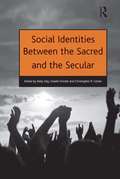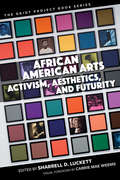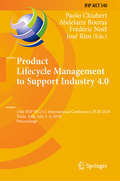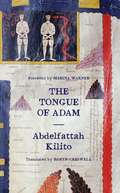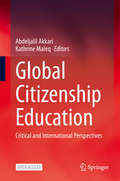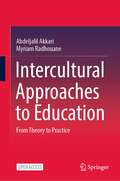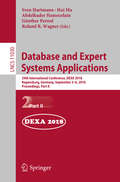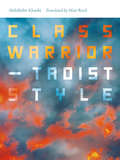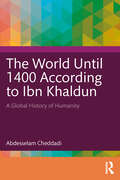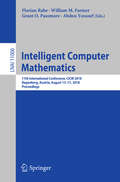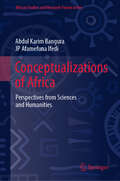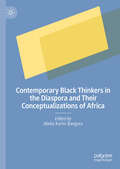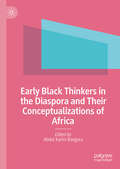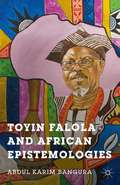- Table View
- List View
Broadening the Contours in the Study of Black Politics: Political Development and Black Women (National Political Science Review Ser.)
by Aaron WildavskyBroadening the Contours in the Study of Black Politics, volume 17 of the National Political Science Review (NPSR), is divided thematically into two books, available separately or as a set. The first concentrates on the institutional aspects of Black politics. The second book addresses various dimensions of social capital that constitute the fundamental building blocks of Black politics. Each contains peer-reviewed articles, a symposium section, and book reviews, as well as other featured sections.Together, these books build on the previous NPSR volume, Black Women in Politics. The symposium in Volume 17:1 examines the struggle of Black women, both in the political science discipline and in getting their work published. In the symposium section of Volume 17:2, members of the National Conference of Black Political Scientists carry on a revealing conversation about the dilemmas of professional life for Black women in political science.The set also contains a section called "Trends," which offers data to use as starting points for discussions in teaching, on professional panels, or in the mass media, regarding the new versions of the Voting Rights Act after the Shelby County v. Holder decision of 2013. Both volumes 17:1 and 17:2 contain rigorously vetted articles on significant themes in the study of Black politics. This set represents the most recent offering in the distinguished National Political Science Review series.
Culture and Social Theory
by Aaron WildavskyAaron Wildavsky, along with Mary Douglas, identified what they called grid-group theory. Wildavsky began calling this "cultural theory," and applied it to an astounding array of subjects. The essays in this volume exemplify the theory's potential contributions to three seemingly disparate, but related, areas: the social construction of meaning, normative/analytic political philosophy, and a theory of rational choices. This book is the first in a series of Aaron Wildavsky's collected writings being published posthumously by Transaction. Wildavsky selected, sequenced, and grouped all but three of the essays included in Culture and Social Theory prior to his death. Some are presented here for the first time. Wildavsky's cultural theory provides ways to organize and interpret the world.In the first section, he shows how social scientists, particularly economists and sociologists, apply the theory. Wildavsky argues that concepts such as externalities, public goods, altruism, and even risk and rape are tools of rival, ubiquitous cultures engaged in perpetual struggle with one another. The second section deals with cultural theory as a way to interpret the works of normative and analytic political philosophers, including Thomas Hobbes and John Stuart Mill, on competing human objectives. Wildavsky argues that particular types of interaction among a society's cultures are necessary for effective realization of basic concepts such as democracy. In the third section, Wildavsky applies cultural theory in conjunction with instrumental rationality, the former as a theory of preference formation, the latter as a device for realizing preferences efficiently. High-priority objectives, and thus the character of norms and rational action, shift across cultures. The world and its various elements comprise a complex, frequently changing, and thus ambiguous reality, nowhere more so than in the dynamic contours of the United States. For cultural theory, individualistic, hierarchical, and egalitarian interpretations of the world are the only ones capable of forming and sustaining institutions and related patterns of social relations that will support human social groups.Wildavsky's central objective is to strip away the camouflage and to reveal varying domains of social life as fields of cultural competition. Culture and Social Theory will be a necessary addition to the libraries of political scientists, economists, and policymakers, not to mention all those who admire Aaron Wildavsky and his work.
The Revolt Against the Masses: And Other Essays on Politics and Public Policy
by Aaron WildavskyThe author of this stunning set of essays on politics and public policy makes crystal clear the meaning of the title. "The revolutionaries of contemporary America do not seek to redistribute privilege from those who have it to those who do not. These radicals wish to arrange a transfer of power from those elites who now exercise it to another elite, namely themselves, who do not. This aspiring elite is of the same race (white), the same class (upper middle and upper), and the same educational background (the best colleges and universities) as those they wish to displace." Wildavsky's bracing work takes a close look at these elites, who probably make up little more than one percent of the population. He sees their common denominator as hostility toward the masses, anti-American attitudes, derision of authority, and a belief in participatory rather than representative politics. The author carries through these themes in a variety of essays on black-white racial relations, social work orientations and black militancy, the politics of budgetary reform, elite and mass trends in the political party system, and the substitution of bureaucratic for democratic modes of advancing the policy process. This work is, in short, vintage Wildavsky: tough minded, spirited, and plain-spoken political analysis. In his new Introduction, Irving Louis Horowitz examines what has changed and what continues to be salient in Wildavsky's line of analysis. Essentially, the report card on The Revolt Against the Masses is that the situation described in these essays has changed somewhat in style but hardly at all in substance. The nuclear shield replaces the ABM treaty, and Afghanistan replaces Vietnam as centers of political gravity-but the same coalition of forces across party and economy still dominate the American political process. The justifiably famous essay on "The Two Presidencies" shows how persistent is the gap between the conflict over domestic priorities and the consensus on foreign policy-and why. This is, in short, a classic text that continues to merit careful study by all those interested in political life. Aaron Wildavsky was, until his death in 1993, professor of political science and public policy at the University of California in Berkeley. He was also director of its Survey Research Center. He served as director of the Russell-Sage Foundation, was a president of the American Political Science Association, and held a number of visiting professorships during his lifetime. Most recently, Transaction has posthumously published Wildavsky's complete essays and papers in five volumes. Irving Louis Horowitz is Hannah Arendt distinguished university professor emeritus at Rutgers, The State University, and longtime friend and associate of Aaron Wildavsky.
Musicians in the Making: Pathways to Creative Performance (Studies In Musical Performance As Creative Practice Series)
by John Rink Helena Gaunt Aaron WilliamonThis book explores the creative development of musicians in both formal and informal learning contexts. It promotes a novel view of creativity, emphasizing its location within creative processes rather than understanding it as an innate quality. It argues that such processes may be learned and refined, and furthermore that collaboration and interaction within group contexts carry significant potential to inform and catalyze creative experiences and outcomes. The book also traces and models the ways in which creative processes evolve over time. Performers, music teachers and researchers will find the rich body of material assembled here engaging and enlightening. The book's three parts focus in turn on 'Creative learning in context', 'Creative processes' and 'Creative dialogue and reflection'. In addition to sixteen extended chapters written by leading experts in the field, the volume includes ten 'Insights' by internationally prominent performers, performance teachers and others. Practical aids include abstracts and lists of keywords at the start of each chapter, which provide useful overviews and guidance on content. Topics addressed by individual authors include intrapersonal and interpersonal dynamics, performance experience, practice and rehearsal, 'self-regulated performing', improvisation, self-reflection, expression, interactions between performers and audiences, assessment, and the role of academic study in performers' development.
Moral Epistemology (New Problems of Philosophy)
by Aaron ZimmermanHow do we know right from wrong? Do we even have moral knowledge? Moral epistemology studies these and related questions about our understanding of virtue and vice. It is one of philosophy’s perennial problems, reaching back to Plato, Aristotle, Aquinas, Locke, Hume and Kant, and has recently been the subject of intense debate as a result of findings in developmental and social psychology. In this outstanding introduction to the subject Aaron Zimmerman covers the following key topics: What is moral epistemology? What are its methods? Including a discussion of Socrates, Gettier and contemporary theories of knowledge skepticism about moral knowledge based on the anthropological record of deep and persistent moral disagreement, including contextualism moral nihilism, including debates concerning God and morality and the relation between moral knowledge and our motives and reasons to act morally epistemic moral scepticism, intuitionism and the possibility of inferring ‘ought’ from ‘is,’ discussing the views of Locke, Hume, Kant, Ross, Audi, Thomson, Harman, Sturgeon and many others how children acquire moral concepts and become more reliable judges criticisms of those who would reduce moral knowledge to value-neutral knowledge or attempt to replace moral belief with emotion. Throughout the book Zimmerman argues that our belief in moral knowledge can survive sceptical challenges. He also draws on a rich range of examples from Plato’s Meno and Dickens’ David Copperfield to Bernard Madoff and Saddam Hussein. Including chapter summaries and annotated further reading at the end of each chapter, Moral Epistemology is essential reading for all students of ethics, epistemology and moral psychology.
The Routledge Handbook of Moral Epistemology (Routledge Handbooks in Philosophy)
by Mark Timmons Karen Jones Aaron ZimmermanThe Routledge Handbook of Moral Epistemology brings together philosophers, cognitive scientists, developmental and evolutionary psychologists, animal ethologists, intellectual historians, and educators to provide the most comprehensive analysis of the prospects for moral knowledge ever assembled in print. The book’s thirty chapters feature leading experts describing the nature of moral thought, its evolution, childhood development, and neurological realization. Various forms of moral skepticism are addressed along with the historical development of ideals of moral knowledge and their role in law, education, legal policy, and other areas of social life. Highlights include: • Analyses of moral cognition and moral learning by leading cognitive scientists • Accounts of the normative practices of animals by expert animal ethologists • An overview of the evolution of cooperation by preeminent evolutionary psychologists • Sophisticated treatments of moral skepticism, relativism, moral uncertainty, and know-how by renowned philosophers • Scholarly accounts of the development of Western moral thinking by eminent intellectual historians • Careful analyses of the role played by conceptions of moral knowledge in political liberation movements, religious institutions, criminal law, secondary education, and professional codes of ethics articulated by cutting-edge social and moral philosophers.
Automated Deduction - CADE-25: 25th International Conference on Automated Deduction, Berlin, Germany, August 1-7, 2015, Proceedings (Lecture Notes in Computer Science #9195)
by Amy P. Felty Aart MiddeldorpThis book constitutes the proceedings of the 25th International Conference on Automated Deduction, CADE-25, held in Berlin, Germany, in August 2015. The 36 revised full papers presented ( 24 full papers and 12 system descriptions) were carefully reviewed and selected from 85 submissions. CADE is the major forum for the presentation of research in all aspects of automated deduction, including foundations, applications, implementations and practical experience.
The Role of Civil Society in Africa’s Quest for Democratization
by Abadir M. IbrahimThis book tests many of the assumptions, hypotheses, and conclusions connected with the presumed role of civil society organizations in the democratization of African countries. Taking a comparative approach, it looks at countries that have successfully democratized, those that are stuck between progress and regression, those that have regressed into dictatorship, and those that are currently in transitional flux and evaluates what role, if any, civil society has played in each instance. The countries discussed--South Africa, Ghana, Nigeria, Ethiopia, Egypt and Tunisia--represent a diverse set of social and political circumstances and different levels of democratic achievement, providing a rich set of case studies. Each sample state also offers an internal comparison, as each has historically experienced different stages of democratization. Along the course of each case study, the book also considers the effect that other traditionally studied factors, such as culture, colonization, economic development and foreign aid, may have had on individual attempts at democratization. The first extensive work on civil society and democratization in Africa, the book adds new insights to the applicability of democratization theory in a non-Western context, both filling a gap in and adding to the existing universal scholarship. This book will be useful for scholars of political science, economics, sociology and African studies, as well as human rights activists and policy makers in the relevant geographical areas.
Conceptions of Justice from Islam to the Present (Political Economy of Islam)
by Abbas Mirakhor Hossein AskariThis book explains a perspective on the system of justice that emerges in Islam if rules are followed and how the Islamic system is differentiated from the conventional thinking on justice. It examines conceptions of justice from the Enlightenment to Bentham to Rawls to contemporary philosophers including Sen, Cohen, Nussbaum, and Pogge. The authors present the views of twentieth century Muslim thinkers on justice who see Muslims upholding rituals but not living according to Qur’anic rules. It provides empirical surveys of the current state of justice in Muslim countries analyzing the economic, social, and political state of affairs. The authors conclude by assessing the state of justice-injustice in Muslim countries and highlighting areas in need of attention for justice to prevail.
The Forgotten Years of Kurdish Nationalism in Iran (Minorities in West Asia and North Africa)
by Abbas ValiThis book investigates the forgotten years of Kurdish nationalism in Iran, from the fall of the Kurdish republic to the advent of the Iranian revolution. An original and path-breaking investigation of the period, it sheds light not only on the historical specificity of the phenomenon of nationalism in exile, but also on the political processes and practices defining the development of Kurdish nationalism in the post-revolutionary era. Although nationalist landmarks such as the Kurdish republic in 1946 and the resurgence of the movement in the revolutionary conjuncture of 1978-79 have attracted the attention of historians and social scientists in recent years, little is known about the three decades of Kurdish nationalism in exile between these two events. This analysis draws on contemporary poststructuralist theory to question the concept of the minority in democratic and constitutional theory, arguing that it is an effect of the discursive linkage between sovereign power and the dominant ethnic-linguistic identity in the nation-state. This text will appeal to a wide academic audience ranging from the fields of Kurdish, Iranian and Middle East Studies to ethnicity, nationalism, government, and political science.
Animals in Tillich's Philosophical Theology (The Palgrave Macmillan Animal Ethics Series)
by Abbey-Anne SmithThis book explores how Paul Tillich’s systematic theology, focusing on the concepts of being and reason can benefit nonhuman animals, while also analysing how taking proper account of nonhuman animals can prove immensely beneficial. The author first explains the body of Tillich’s system, examining reason and revelation, life and the spirit, and history and the kingdom of God. The second section undertakes a critical analysis of Tillichian concepts and their adequacy in relation to nonhuman animals, addressing topics such as Tillich’s concept of ‘technical reason’ and the multidimensional unity of life. The author concludes by discussing the positive concepts in Tillich’s systematic theology with respect to nonhuman animals and creation, including the concept of universal salvation and Tillich’s interpretation of nonhuman animals and the Fall in Genesis.
Social Identities Between the Sacred and the Secular (Ashgate Ahrc/esrc Religion And Society Ser.)
by Christopher R. Cotter Abby Day Giselle VincettFocusing on the important relationship between the 'sacred' and the 'secular', this book demonstrates that it is not paradoxical to think in terms of both secular and sacred or neither, in different times and places. International experts from a range of disciplinary perspectives draw on local, national, and international contexts to provide a fresh analytical approach to understanding these two contested poles. Exploring such phenomena at an individual, institutional, or theoretical level, each chapter contributes to the central message of the book - that the ’in between’ is real, embodied and experienced every day and informs, and is informed by, intersecting social identities. Social Identities between the Sacred and the Secular provides an essential resource for continued research into these concepts, challenging us to re-think where the boundaries of sacred and secular lie and what may lie between.
African American Arts: Activism, Aesthetics, and Futurity (The Griot Project Book Series)
by Sharrell D. Luckett Carmen Gillespie Rikki Byrd Amber Lauren Johnson Doria E. Charlson Florencia V. Cornet Daniel McNeil Lucy Caplan Genevieve Hyacinthe Sammantha McCalla Nettrice R. Gaskins Abby Dobson J. Michael Kinsey Shondrika Moss-Bouldin Julie B. Johnson Jasmine Eileen Coles Tawnya Pettiford-Wates Rickerby HindsSignaling such recent activist and aesthetic concepts in the work of Kara Walker, Childish Gambino, BLM, Janelle Monáe, and Kendrick Lamar, and marking the exit of the Obama Administration and the opening of the National Museum of African American History and Culture, this anthology explores the role of African American arts in shaping the future, and further informing new directions we might take in honoring and protecting the success of African Americans in the U.S. The essays in African American Arts: Activism, Aesthetics, and Futurity engage readers in critical conversations by activists, scholars, and artists reflecting on national and transnational legacies of African American activism as an element of artistic practice, particularly as they concern artistic expression and race relations, and the intersections of creative processes with economic, sociological, and psychological inequalities. Scholars from the fields of communication, theater, queer studies, media studies, performance studies, dance, visual arts, and fashion design, to name a few, collectively ask: What are the connections between African American arts, the work of social justice, and creative processes? If we conceive the arts as critical to the legacy of Black activism in the United States, how can we use that construct to inform our understanding of the complicated intersections of African American activism and aesthetics? How might we as scholars and creative thinkers further employ the arts to envision and shape a verdant society? Contributors: Carrie Mae Weems, Carmen Gillespie, Rikki Byrd, Amber Lauren Johnson, Doria E. Charlson, Florencia V. Cornet, Daniel McNeil, Lucy Caplan, Genevieve Hyacinthe, Sammantha McCalla, Nettrice R. Gaskins, Abby Dobson, J. Michael Kinsey, Shondrika Moss-Bouldin, Julie B. Johnson, Sharrell D. Luckett, Jasmine Eileen Coles, Tawnya Pettiford-Wates, Rickerby Hinds. Published by Bucknell University Press. Distributed worldwide by Rutgers University Press.
Product Lifecycle Management to Support Industry 4.0: 15th Ifip Wg 5. 1 International Conference, Plm 2018, Turin, Italy, July 2-4, 2018, Proceedings (IFIP Advances in Information and Communication Technology #540)
by Abdelaziz Bouras José Ríos Paolo Chiabert Frédéric NoëlThis book constitutes the refereed post-conference proceedings of the 15th IFIP WG 5.1 International Conference on Product Lifecycle Management, PLM 2018, held in Turin, Spain, in July 2018.The 72 revised full papers presented were carefully reviewed and selected from 82 submissions. The papers are organized in the following topical sections: building information modeling; collaborative environments and new product development; PLM for digital factories and cyber physical systems; ontologies and data models; education in the field of industry 4.0; product-service systems and smart products; lean organization for industry 4.0; knowledge management and information sharing; PLM infrastructure and implementation; PLM maturity, implementation and adoption; 3D printing and additive manufacturing; and modular design and products and configuration and change management.
The Tongue of Adam
by Marina Warner Robyn Creswell Abdelfattah KilitoA playful and erudite look at the origins of language In the beginning there was one language--one tongue that Adam used to compose the first poem, an elegy for Abel. "These days, no one bothers to ask about the tongue of Adam. It is a naive question, vaguely embarrassing and irksome, like questions posed by children, which one can only answer rather stupidly." So begins Abdelfattah Kilito's The Tongue of Adam, a delightful series of lectures. With a Borgesian flair for riddles, stories, and subtle scholarly distinctions, Kilito presents an assortment of discussions related to Adam's tongue, including translation, comparative religion, and lexicography: for example, how, from Babel onward, can we explain the plurality of language? Or can Adam's poetry be judged aesthetically, the same as any other poem? Drawing from the commentators of the Koran to Walter Benjamin, from the esoteric speculations of Judaism to Herodotus, The Tongue of Adam is a nimble book about the mysterious rise of humankind's multilingualism.
Global Citizenship Education: Critical and International Perspectives
by Abdeljalil Akkari Kathrine MaleqThis open access book takes a critical and international perspective to the mainstreaming of the Global Citizenship Concept and analyses the key issues regarding global citizenship education across the world. In that respect, it addresses a pressing need to provide further conceptual input and to open global citizenship agendas to diversity and indigeneity. Social and political changes brought by globalisation, migration and technological advances of the 21st century have generated a rise in the popularity of the utopian and philosophical idea of global citizenship. In response to the challenges of today’s globalised and interconnected world, such as inequality, human rights violations and poverty, global citizenship education has been invoked as a means of preparing youth for an inclusive and sustainable world. In recent years, the development of global citizenship education and the building of students’ global citizenship competencies have become a focal point in global agendas for education, international educational assessments and international organisations. However, the concept of global citizenship education still remains highly contested and subject to multiple interpretations, and its operationalisation in national educational policies proves to be challenging. This volume aims to contribute to the debate, question the relevancy of global citizenship education’s policy objectives and to enhance understanding of local perspectives, ideologies, conceptions and issues related to citizenship education on a local, national and global level. To this end, the book provides a comprehensive and geographically based overview of the challenges citizenship education faces in a rapidly changing global world through the lens of diversity and inclusiveness.
Intercultural Approaches to Education: From Theory to Practice
by Abdeljalil Akkari Myriam RadhouaneThis open access book provides an analysis of contemporary societies and schools shaped by cultural diversity, globalization and migration. This diversity is necessarily reflected in education systems and requires the promotion of intercultural approaches able to improve learning processes and the quality of education. From an international and comparative perspective, this book first presents theoretical and conceptual foundations for seriously considering cultural diversity. The book also compares intercultural approaches and debates generated in countries as diverse as the United States, Canada, Brazil, Switzerland and France. For each national context, the book addresses both the historical roots of intercultural approaches and the concrete initiatives driven by educational policies for their implementation in schools and classrooms. Finally, the book presents discussions surrounding the treatment of linguistic or religious diversity in schools, the emergence of global citizenship education and the key role of teachers in intercultural approaches.This is an open access book.
Database and Expert Systems Applications: 29th International Conference, DEXA 2018, Regensburg, Germany, September 3–6, 2018, Proceedings, Part II (Lecture Notes in Computer Science #11030)
by Abdelkader Hameurlain Sven Hartmann Hui Ma Günther Pernul Roland R. WagnerThis two volume set of LNCS 11029 and LNCS 11030 constitutes the refereed proceedings of the 29th International Conference on Database and Expert Systems Applications, DEXA 2018, held in Regensburg, Germany, in September 2018.The 35 revised full papers presented together with 40 short papers were carefully reviewed and selected from 160 submissions. The papers of the first volume discuss a range of topics including: Big data analytics; data integrity and privacy; decision support systems; data semantics; cloud data processing; time series data; social networks; temporal and spatial databases; and graph data and road networks. The papers of the second volume discuss a range of the following topics: Information retrieval; uncertain information; data warehouses and recommender systems; data streams; information networks and algorithms; database system architecture and performance; novel database solutions; graph querying and databases; learning; emerging applications; data mining; privacy; and text processing.
Class Warrior—Taoist Style
by Matt Reeck Abdelkéir KhatibiAbdelkébir Khatibi (1938–2009) is one of the most important writers and thinkers to emerge from North Africa in the second half of the twentieth century. Though not widely known beyond the Francophone world, Khatibi’s critical and creative works speak to the central concerns of postcolonial and postmodern life. Offered here in English for the first time, his long poem from 1976, Le lutteur de classe à la manière taoïste is a wildly inventive, transgressive, and important text. Class Warrior delivers a kind of free-verse Marxist handbook, written with the energy, movement, and style of a highly idiosyncratic Taoism. Matt Reeck’s compelling translation captures the stylistic and thematic beats of Khatibi’s verse, rendering the deceptively simple language of the original without losing its extraordinary layers and complexities. The introduction provides biographical context and an overview of Khatibi’s poetics of the orphan, a subject position that seeks to avoid authenticating notions of origins and that is also constantly restless and forever questing. This is a rich text for contemporary readers of poetry, as well as scholars of postcolonial theory.
The World Until 1400 According to Ibn Khaldun: A Global History of Humanity
by Abdesselam CheddadiThis book explores the significance of Ibn Khaldun’s magnum opus, the Book of Examples, to our understanding of human history and the disciplines of anthropology, history, and sociology.Operating outside of the confines of the Western intellectual tradition, Ibn Khaldun’s the Book of Examples is perhaps the first attempt to propose a global history of humanity. In doing so, Ibn Khaldun pioneered approaches from what we today term sociology, anthropology, ecology, economics, geography, and urban studies. Drawing upon the Muqaddima and the other volumes of the Kitab al-Ibar, Cheddadi proposes novel ways of viewing human history and classifying societies. While Ibn Khaldun’s attempts to develop a true global history were ultimately flawed, Cheddadi argues that they nevertheless offer pertinent lessons for our attempts to write a global history and to understand the world today.This stimulating and original work on a seminal figure in Islamic sociology and historiography will be of interest to students and researchers across the humanities and social sciences.
Intelligent Computer Mathematics: 11th International Conference, CICM 2018, Hagenberg, Austria, August 13-17, 2018, Proceedings (Lecture Notes in Computer Science #11006)
by Florian Rabe William M. Farmer Grant O. Passmore Abdou YoussefThis book constitutes the refereed proceedings of the 11th International Conference on Intelligent Computer Mathematics, CICM 2018, held in Hagenberg, Austria, in August 2018. The 23 full papers presented were carefully reviewed and selected from a total of 36 submissions. The papers focos on the Calculemus, Digital Mathematics Libraries, and Mathematical Knowledge Management tracks which also correspond to the subject areas of the predecessor meetings. Orthogonally, the Systems and Projects track called for descriptions of digital resources, such as data and systems, and of projects, whether old, current, or new, and survey papers covering any topics of relevance to the CICM community.
Conceptualizations of Africa: Perspectives from Sciences and Humanities (African Studies and Research Forum Series)
by Abdul Karim Bangura Jp Afamefuna IfediThis book discusses how Africa has been understood and defined across various academic fields. Building on the influential works of Valentin-Yves Mudimbe and more recent studies by Axel Fleisch and Rhiannon Stephens, this book bridges previous limitations by offering a comprehensive, interdisciplinary analysis. Each chapter examines the conceptualization of Africa within a specific discipline, balancing local and global perspectives, blending competing viewpoints, and providing suggestions for future research. The book will be essential for students, scholars, and researchers interested in a better understanding of the diverse and complex narratives that shape our knowledge of Africa and its intellectual heritage.
Contemporary Black Thinkers in the Diaspora and Their Conceptualizations of Africa
by Abdul Karim BanguraThis book contends that Afrocentricity and other ideas birthed by major contemporary Black thinkers in the Diaspora are wellsprings for helping to build a new Africa. This book examines these ideas, which have given rise to the Africanist Perspective on the Motherland to place Africa at the center of all intellectual discourses pertaining to African people everywhere while at the same time challenging the pervasive and pernicious Eurocentric myth of African people being inactive agents in history. These contributions from a global range of scholars across disciplines examine the work of contemporary great Black thinkers as sources that can be employed to help in the construction of a new Africa. Each chapter examines how these thinkers conceptualized Africa in their works, with the main objective of delineating their conceptualizations to generate suggestions on how to rebuild the continent.
Early Black Thinkers in the Diaspora and Their Conceptualizations of Africa
by Abdul Karim BanguraThis book argues that just as the ideas of Pan-Africanism birthed by Henry Sylvester-Williams and others in the late 1800s and Negritude ushered by Aimé Césaire and others in the early 1900s emboldened many major Black thinkers to push for independence across Africa, so will these early thinkers’ ideas help in the building of a new Africa. The various chapters explore the proposition that the thoughts of early great Diaspora Black thinkers are still wellsprings of tenets that can be used to build a new Africa. The chapters examine how these thinkers conceptualized Africa in their works, with the main objective of delineating their conceptualizations to generate suggestions on how to build a new Africa.
Toyin Falola and African Epistemologies
by Abdul Karim BanguraWhile there are five important festschriften on Toyin Falola and his work, this book fulfills the need for a single-authored volume that can be useful as a textbook. I develop clearly articulated rubrics and overarching concepts as the foundational basis for analyzing Falola's work.
